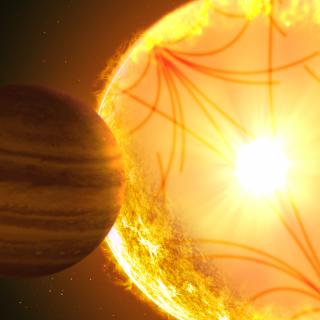Bibcode
Salabert, D.; García, R. A.; Pallé, P. L.; Jiménez-Reyes, S. J.
Bibliographical reference
Astronomy and Astrophysics, Volume 504, Issue 1, 2009, pp.L1-L4
Advertised on:
9
2009
Journal
Citations
84
Refereed citations
49
Description
We study the response of the low-degree, solar p-mode frequencies to the
unusually extended minimum of solar surface activity since 2007. A total
of 4768 days of observations collected by the space-based, Sun-as-a-star
helioseismic GOLF instrument are analyzed. A multi-step iterative
maximum-likelihood fitting method is applied to subseries of 365 days
and 91.25 days to extract the p-mode parameters. Temporal variations in
the l=0, 1, and 2 p-mode frequencies are then obtained from April 1996
to May 2009. While the p-mode frequency shifts are closely correlated
with solar surface activity proxies during the past solar cycles, the
frequency shifts of the l=0 and l=2 modes increase from the second half
of 2007, when no significant surface activity is observable. On the
other hand, the l=1 modes follow the general decreasing trend of solar
surface activity. The different behaviors between the l=0 and l=2 modes
and the l=1 modes may be interpreted as different geometrical responses
to the spatial distribution of the solar magnetic field beneath the
surface of the Sun. The analysis of the low-degree, solar p-mode
frequency shifts indicates that the solar activity cycle 24 started in
late 2007, despite the absence of activity on the solar surface.
Related projects

Helio and Astero-Seismology and Exoplanets Search
The principal objectives of this project are: 1) to study the structure and dynamics of the solar interior, 2) to extend this study to other stars, 3) to search for extrasolar planets using photometric methods (primarily by transits of their host stars) and their characterization (using radial velocity information) and 4) the study of the planetary
Savita
Mathur